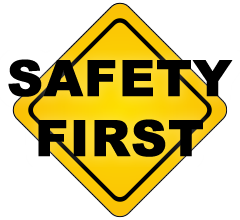
Published on: July 25, 2019
Safety First: A Parents Guide on Planning for Your Child’s Safety Skills
Safety of your child is every parent’s first priority, and this is only truer when you have a child with a special need, like autism. Why then are safety skills so frequently left out of your child’s daily learning routines? Take a look below at our top five safety skills that you can start practicing with your child today!
In an emergency situation you want to make sure that your child is able to tell other individuals the most important information about themselves – their name, address, and a parent name. A simple way to start teaching this skill is by having all of this information written on a card and having them practice handing the card to you when you ask “what’s your name?” Depending on your child’s skill level, and as they make progress, you can teach them to say, write, or point to specific information on the card.
- Avoiding Unsafe Household Items
No parent can keep their eyes on their child all day long and so teaching them what items in the household are unsafe for them is an important skill. While your child is learning this skill it is recommended that all unsafe items (sharp objects, cleaning products, etc.) be kept secured and out of reach of your child. You may start practicing this skill by finding a symbol that you will use in your house to help your child discriminate what is unsafe – a red circle with a line through it is a common symbol. Your child should practice avoiding (or staying away from) items with this symbol on them. Start by practicing together with just one item.
Decreasing any wandering or darting behavior when you take your child to the store, park or baseball game is a great way to increase their overall safety. Depending on your child you may start this by always holding their hand or being within an arm’s reach when you’re out. Give your child verbal praise (“I love how you’re staying with me!”), possibly along with something preferred that your child really likes (an M&M, a tickle, etc.) for every minute that they stay with you.
Every parent should be aware of the potential dangers of open water, however many kids with autism are particularly drawn to water and water play. Children should always be monitoring when in/around water, no matter how deep or shallow. Enrolling your child in swim lessons is a great way to establish water safety skills and help your child understand rules around water.
- Potty Training
Being independent with self-care routines like potty-training is one of the best ways that an individual can keep themselves safe throughout their lives. Talk with your team about bathroom independence for your child and ways that you can practice at home and at school.
So, now that you have an idea of where to begin, go ahead and started! Start where you can with the resources that you have, but also talk with team members and professional about how to include these skills in other areas of programming, like on your child’s IEP. And always remember, you’re never too early or too late to begin working on these skills – they will serve your child throughout the rest of their life.